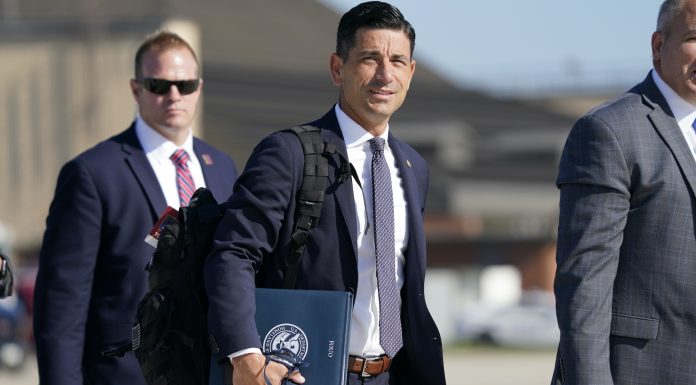(Headline USA) Hackers gained access to email accounts belonging to the Trump administration’s head of the Department of Homeland Security and members of the department’s cybersecurity staff whose jobs included hunting threats from foreign countries, The Associated Press has learned.
The intelligence value of the hacking of then-acting Secretary Chad Wolf and his staff is not publicly known.
Their accounts were accessed as part of what’s known as the SolarWinds intrusion, and it throws into question how the U.S. government can protect individuals, companies and institutions across the country if it can’t protect itself.
The short answer for many security experts and federal officials is that it can’t — at least not without some significant changes.
“The SolarWinds hack was a victory for our foreign adversaries, and a failure for DHS,” said Sen. Rob Portman of Ohio, top Republican on the Senate’s Homeland Security and Governmental Affairs Committee. “We are talking about DHS’s crown jewels.”
The Biden administration has tried to keep a tight lid on the scope of the SolarWinds attack as it weighs retaliatory measures against Russia, the administration’s top suspect.
Russia has denied any role in the hack.
But an inquiry by the AP found new details about the breach at DHS and other agencies, including the Energy Department, where hackers accessed top officials’ schedules.
The AP interviewed more than a dozen current and former U.S. government officials, who spoke on the condition of anonymity because of the confidential nature of the ongoing investigation into the hack.
The vulnerabilities at Homeland Security, in particular, intensify the worries following the SolarWinds attack and an even more widespread hack affecting Microsoft Exchange’s email program, especially because in both cases the hackers were detected not by the government but by a private company.
In December, officials discovered what they describe as a sprawling, monthslong cyberespionage effort done largely through a hack of a widely used software from Texas-based SolarWinds Inc. At least nine federal agencies were hacked, along with dozens of private-sector companies.
U.S. authorities have said the breach appeared to be the work of Russian hackers. Gen. Paul Nakasone, who leads the Pentagon’s cyber force, said last week that the Biden administration is considering a “range of options” in response.
Since then, a series of headline-grabbing hacks has further highlighted vulnerabilities in the U.S. public and private sectors.
A hacker tried unsuccessfully to poison the water supply of a small town in Florida in February, and this month a new breach was announced involving untold thousands of Microsoft Exchange email servers that the company says was carried out by Chinese state hackers. China has denied involvement in the Microsoft breach.
Sen. Mark Warner, a Virginia Democrat and head of the Senate Intelligence Committee, said the government’s initial response to the discovery of the SolarWinds hack was disjointed.
“What struck me was how much we were in the dark for as long as we were in the dark,” Warner said at a recent cybersecurity conference.
Wolf and other top Homeland Security officials used new phones that had been wiped clean along with the popular encrypted messaging system Signal to communicate in the days after the hack, current and former officials said.
One former administration official, who confirmed the Federal Aviation Administration was among the agencies affected by the breach, said the agency was hampered in its response by outdated technology and struggled for weeks to identify how many servers it had running SolarWinds software.
The FAA initially told the AP in mid-February that it had not been affected by the SolarWinds hack, only to issue a second statement a few days later that it was continuing to investigate.
At least one other Cabinet member besides Wolf was affected. The hackers were able to obtain the schedules of officials at the Energy Department, including then-Secretary Dan Brouillette, one former high-placed administration official said. The schedules were not confidential and are subject to open records laws.
Energy Department spokesman Kevin Liao said it “has found no evidence the network that maintains senior officials’ schedules was compromised.”
The new disclosures provide a fuller picture of what kind of data was taken in the SolarWinds hack. Several congressional hearings have been held on the subject, but they have been notably short on details.
Adapted from reporting by the Associated Press.

